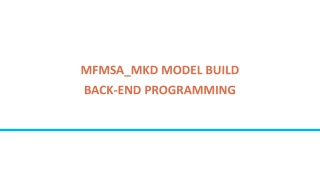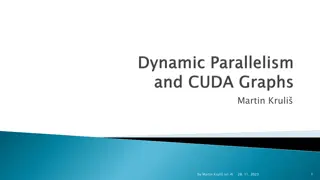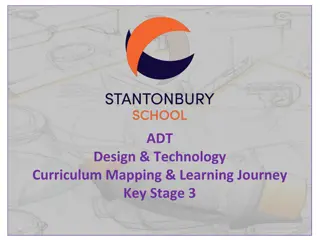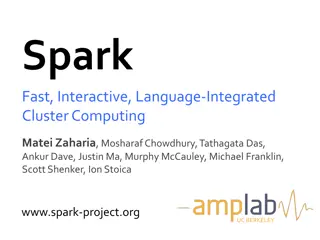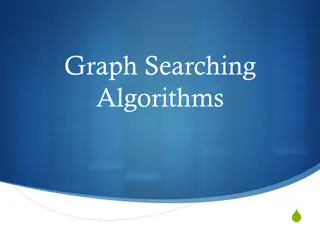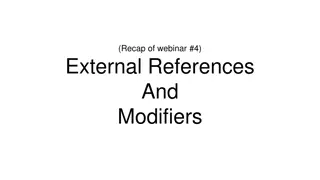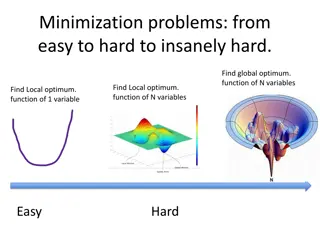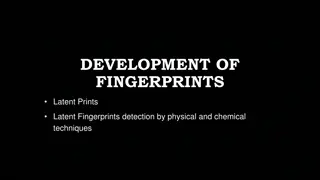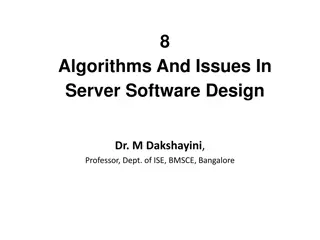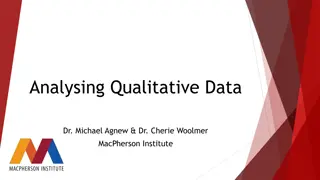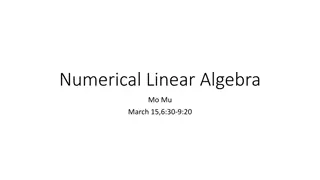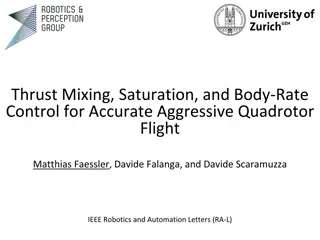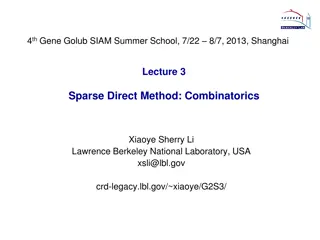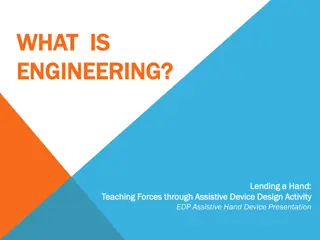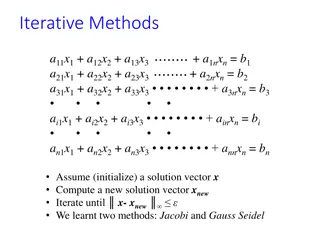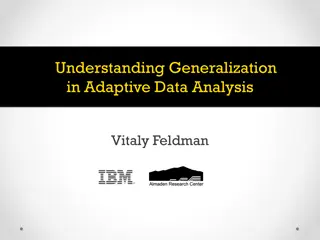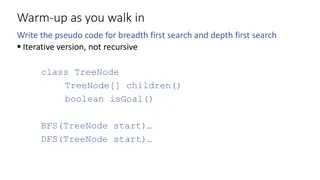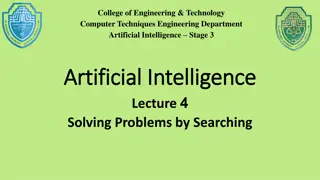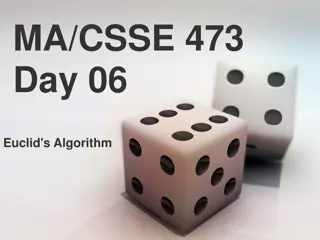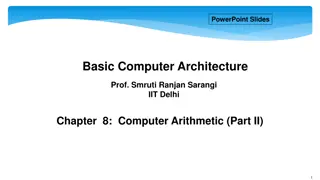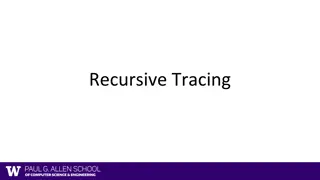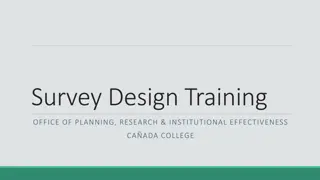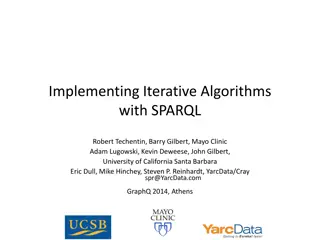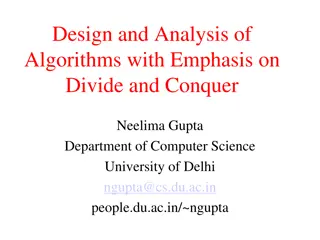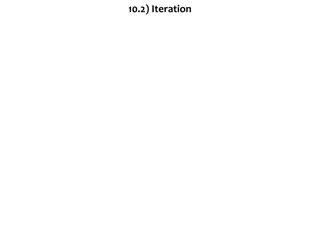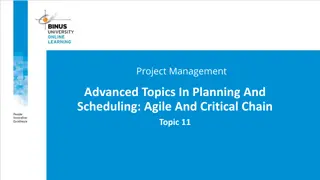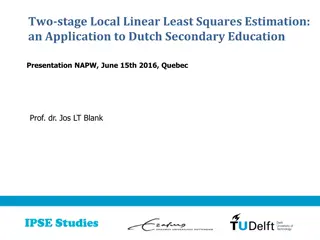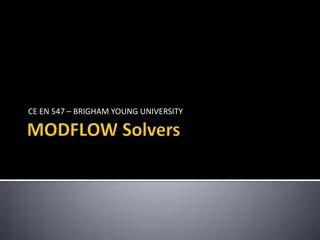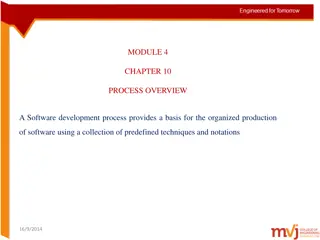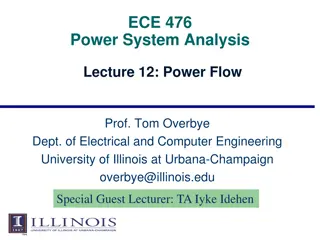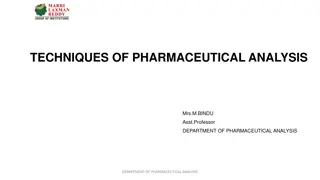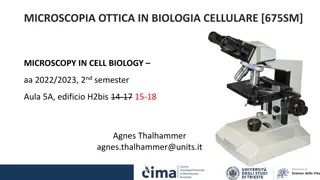Modern End-to-End Programming: Data Preparation, Model Building & Debugging
Prepare, build, debug models covering historical data. Make assumptions, solve equations, ensure data, economic consistency. Iterative processes for accurate simulations.
3 views • 10 slides
GCSE Design Technology Knowledge Organiser and Course Structure Overview
In this detailed knowledge organiser, find information about the GCSE Design Technology course structure, learning objectives, mission statement, and core technical principles for KS4 students. The course emphasizes iterative design cycles, creative thinking, problem-solving, and addressing environm
7 views • 53 slides
Understanding Parallelism in GPU Computing by Martin Kruli
This content delves into different types of parallelism in GPU computing, such as task parallelism and data parallelism, along with discussing unsuitable problems for GPUs and providing solutions like iterative kernel execution and mapping irregular structures to regular grids. The article also touc
1 views • 39 slides
Root Cause Analysis for Campaign Challenges
Root Cause Analysis (RCA) is a problem-solving method used to identify underlying causes of key process challenges in campaigns. It helps in learning from bottlenecks and successes to improve future outcomes. This analysis involves understanding what happened, why it happened, and what actions can b
7 views • 18 slides
Crafting Success How Effective Persona Creation Drives Design Success
Consagous Technologies UI UX Experts has ability to create experiences that resonate with users on a deep and personal level. Effective persona creation is the cornerstone of this success, enabling designers to understand their audience, guide design decisions, foster empathy, and drive iterative im
2 views • 2 slides
What is Email Marketing?
Email marketing is a cornerstone of digital marketing, leveraging targeted email communication to engage subscribers and drive desired outcomes. By crafting compelling content, personalized messages, and strategic segmentation, businesses can cultivate meaningful relationships with their audience. B
1 views • 7 slides
Design & Technology Learning Journey at Key Stage 3
Explore the ADT Design & Technology Curriculum Mapping and Learning Journey at Key Stage 3, focusing on the iterative design process. Dive into the essential concepts, skills, and experiences that students will encounter in this engaging educational pathway.
0 views • 26 slides
Understanding Apache Spark: Fast, Interactive, Cluster Computing
Apache Spark, developed by Matei Zaharia and team at UC Berkeley, aims to enhance cluster computing by supporting iterative algorithms, interactive data mining, and programmability through integration with Scala. The motivation behind Spark's Resilient Distributed Datasets (RDDs) is to efficiently r
0 views • 41 slides
Understanding Breadth-First Search (BFS) Algorithm for Graph Searching
This content delves into the Breadth-First Search (BFS) algorithm, a fundamental graph searching technique. It explains the step-by-step process of BFS, from initializing the graph to traversing vertices in a specific order. Through detailed visual representations, you will gain insights into how BF
1 views • 75 slides
Understanding External References and Modifiers in Provider Networks
Exploring the intricate details of external references, providers, and negotiated rates within provider networks. Learn about in-network files, iterative development, and the nuances of Medicare plans. Uncover the complexities of provider group IDs, negotiated prices, and in-network locations.
1 views • 28 slides
Binary Logistic Regression with SPSS – A Comprehensive Guide by Karl L. Wuensch
Explore the world of Binary Logistic Regression with SPSS through an instructional document provided by Karl L. Wuensch of East Carolina University. Understand when to use this regression model, its applications in research involving dichotomous variables, and the iterative maximum likelihood proced
0 views • 87 slides
Optimization Techniques for Minimization Problems
Explore various minimization problems, from easy to insanely hard, and learn about finding global and local optima using approaches like bisection, Newton's method, and rationalization. Discover efficient methods such as the golden section and iterative approximation with Newton's method for optimiz
0 views • 17 slides
Understanding Fingerprint Development Techniques
Exploring the development of latent fingerprints through physical and chemical methods, conditions affecting latent prints, and various fingerprint development techniques like visual examination, powder techniques, and chemical techniques. Techniques such as alternate light sources and powder method
2 views • 22 slides
Issues and Algorithms in Server Software Design
The content discusses fundamental issues in server software design such as connectionless vs. connection-oriented access, stateless vs. stateful applications, and iterative vs. concurrent server implementations. Various server algorithms like iterative and concurrent servers are explained with their
3 views • 44 slides
Understanding Qualitative Data Analysis Methods
Exploring qualitative data analysis techniques such as Grounded Theory, Structured Coding, Thematic Analysis, and using tools like Nvivo to analyze large datasets. Emphasis is placed on ensuring rigor through iterative processes, understanding biases, and cross-checking themes for trustworthiness.
0 views • 7 slides
Comprehensive Overview of Numerical Linear Algebra Methods for Solving Linear Systems
Explore numerical linear algebra techniques for solving linear systems of equations, including direct and iterative methods. Delve into topics like Gaussian elimination, LU factorization, band solvers, sparse solvers, iterative techniques, and more. Gain insights into basic iterative methods, error
6 views • 12 slides
Advanced Techniques for Quadrotor Flight Control
The research paper discusses thrust mixing, saturation, and body-rate control for precise and aggressive quadrotor flight. It covers system overview, dynamical system modeling, LQR control design, trajectory tracking performance, disturbance rejection, body torque estimation, and iterative thrust mi
0 views • 14 slides
Overview of Sparse Linear Solvers and Gaussian Elimination
Exploring Sparse Linear Solvers and Gaussian Elimination methods in solving systems of linear equations, emphasizing strategies, numerical stability considerations, and the unique approach of Sparse Gaussian Elimination. Topics include iterative and direct methods, factorization, matrix-vector multi
0 views • 35 slides
Understanding Engineering: Concepts and Processes
Engineering is the application of science, math, and technology to design solutions for everyday problems, benefiting society. The Engineering Design Process (EDP) involves defining problems, researching, brainstorming solutions, building prototypes, testing, communicating designs, and redesigning a
0 views • 28 slides
Understanding Iterative Methods in Linear Algebra
Explore the concepts of iterative methods such as Jacobi and Gauss-Seidel for solving systems of linear equations iteratively. Understand conditions for convergence, rate of convergence, and ways to improve convergence speed. Delve into iterative schemes in matrix forms, convergence criteria, eigenv
0 views • 39 slides
Understanding Generalization in Adaptive Data Analysis by Vitaly Feldman
Adaptive data analysis involves techniques such as statistical inference, model complexity, stability, and generalization guarantees. It focuses on sequentially analyzing data with steps like exploratory analysis, feature selection, and model tuning. The approach emphasizes on avoiding hypothesis te
0 views • 25 slides
AI Search Algorithms: BFS and DFS Pseudo-code Iterative Version
Explore the iterative versions of Breadth First Search (BFS) and Depth First Search (DFS) with pseudo-code examples implemented for class TreeNode. Understand the concept of TreeNode, children() function, isGoal() method, and apply BFS and DFS starting from TreeNode start.
0 views • 53 slides
Solving Problems by Searching in Artificial Intelligence: Uninformed Search Strategies
In the field of Artificial Intelligence, solving problems through searching is essential. Uninformed search strategies, also known as blind search, involve exploring the search space without any additional information beyond what is provided in the problem definition. Techniques such as Breadth-Firs
1 views • 26 slides
Understanding Euclid's Algorithm: An Ancient Approach to Finding Greatest Common Divisors
Euclid's Algorithm, dating back 2500 years, offers a simpler method to find the greatest common divisor (gcd) of two non-negative integers compared to traditional factorization. By iteratively applying a rule based on the gcd of remainders, it efficiently computes gcd values. The basis of the algori
0 views • 15 slides
Computer Arithmetic in Basic Computer Architecture
This presentation delves into the realm of computer arithmetic in basic computer architecture, covering essential topics such as addition, multiplication, division, and floating-point operations. The slides illustrate techniques for integer division and the reduction of division problems, along with
0 views • 58 slides
Iterative Feedback Framework for Prototype Improvement
The iterative feedback framework involves making sense of user feedback using the Keep, Chuck, Change, Create (KCCC) model to iterate and enhance prototype solutions. This process helps organize input from testing sessions, informing necessary modifications for better outcomes. The framework emphasi
1 views • 26 slides
Understanding Recursive and Iterative Factorials through Tracing
This content provides an in-depth exploration of recursive and iterative factorial functions through tracing examples. The explanations are accompanied by visual aids to help conceptualize the iterative and recursive processes of calculating factorials. By comparing the two methods side by side, rea
0 views • 7 slides
Survey Design Training for Effective Data Collection
Learn how to conduct surveys effectively by understanding the purpose, developing survey objectives, research questions, and survey questions. Explore survey implementation options, data analysis techniques, and available resources to enhance your data collection process. The iterative nature of the
0 views • 15 slides
Implementing Iterative Algorithms with SPARQL
This comprehensive guide explores the implementation of iterative algorithms with SPARQL, focusing on YarcData/Cray's approach to using these algorithms. It covers YarcData's interest in graphs, the Urika appliance, iterative algorithms in machine learning, implementation approach, and algorithms im
1 views • 12 slides
Algorithms Design and Analysis with Divide and Conquer Approach
Explore the intricacies of algorithm design and analysis, with a focus on divide and conquer techniques. Delve into topics such as iterative and recursive algorithms, writing summations, divide and conquer strategy, and more. Discover how to compute large numbers, polynomials, perform searching and
1 views • 15 slides
Iterative Root Approximation Using Natural Logarithm
The content covers iterative root approximation using natural logarithm in solving equations. It explores finding roots by iterative formulas and demonstrates calculations to reach approximate values. The process involves selecting intervals to show correct values and ensuring continuity for accurat
0 views • 14 slides
CSE 122 Spring 2023: ArrayList Lecture Overview and Example Program - Movie Favorites
In this CSE 122 lecture for Spring 2023, the instructors Tristan Huber and Hunter Schafer introduced ArrayLists, covered announcements, and presented a practice problem highly relevant for the course. They discussed the addAll method, techniques for functional decomposition, and key skills for itera
0 views • 14 slides
Advanced Topics in Agile Project Management: Planning and Scheduling
Explore the nuances of Agile Project Management, Extreme Programming, Theory of Constraints, and Critical Chain scheduling techniques. Learn how Agile PM embraces flexibility and evolving customer needs, contrasting with the structured Waterfall model. Discover the key features and benefits of Agile
0 views • 33 slides
Understanding Two-Stage Local Linear Least Squares Estimation
This presentation by Prof. Dr. Jos LT Blank delves into the application of two-stage local linear least squares estimation in Dutch secondary education. It discusses the pros and cons of stochastic frontier analysis (SFA) and data envelopment analysis (DEA), recent developments in local estimation t
0 views • 24 slides
Understanding Iterative Solvers in MODFLOW
In this content, you will learn about the working of iterative solvers, solver parameters, troubleshooting convergence issues, and various solver algorithms in MODFLOW. The iterative tweaking of starting head values, different solver codes like SIP, PCG2, GMG, and their characteristics are explained
0 views • 21 slides
Software Development Process Overview
A software development process provides a structured approach for creating software using predefined techniques and stages such as system conception, analysis, system design, class design, implementation, testing, training, deployment, and maintenance. It involves stages like domain analysis, applic
0 views • 39 slides
Power System Analysis: Lecture on Power Flow
Lecture 12 on Power Flow Analysis in Power Systems covers the use of power balance equations when analyzing complex power consumption and generation. It explains the derivation of real power balance equations for iterative solutions in power flow analysis. The lecture highlights the need for iterati
0 views • 30 slides
Understanding Fingerprint Development Techniques
Latent fingerprints are hidden impressions left by the friction ridges of the skin which require physical or chemical techniques for visualization. Factors affecting latent prints include surface type, touch manner, weather, humidity, perspiration, and suspect care. Techniques such as visual examina
0 views • 22 slides
Analytical Techniques in Pharmaceutical Analysis
Analytical techniques play a crucial role in determining the identification and concentration of chemical substances in pharmaceutical analysis. Techniques range from simple gravimetric analysis to sophisticated methods using specialized instrumentation. Various techniques like gravimetric, titrimet
0 views • 17 slides
Microscopic Techniques in Cell Biology: Lessons and Labs Overview
Explore the fascinating world of optical microscopy in cellular biology, covering topics such as image formation, contrasting techniques, fluorescence microscopy, live-imaging techniques, and quantitative microscopy. Dive into the principles behind various microscopy techniques and experimental labs
0 views • 7 slides
